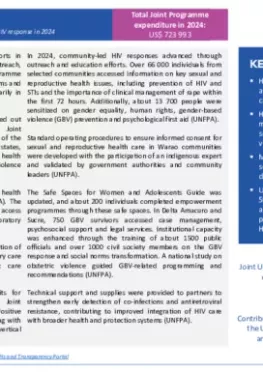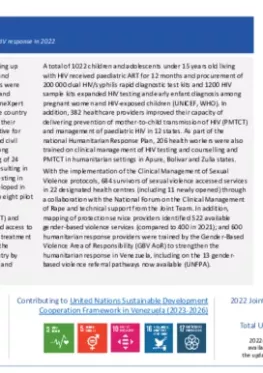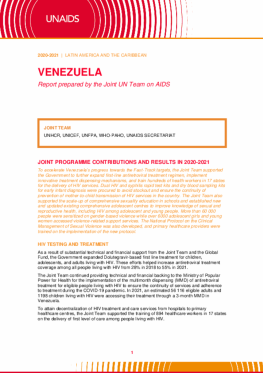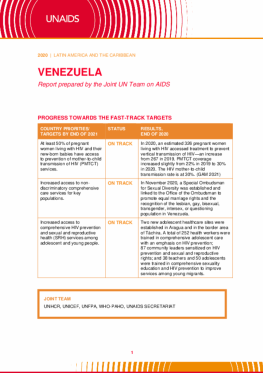|
Venezuela
In 2024, HIV prevention, testing and treatment efforts in Venezuela were expanded through targeted outreach, inclusive care, and capacity building thanks to Joint Programme support. Over 19 000 adolescents received male condoms and information on the prevention of HIV and STIs, primarily in differentiated care settings for adolescents (UNFPA).
Over 15 000 syphilis and 6 500 HIV tests were carried out among the general population. Moreover, the Joint Programme continued to support the implementation of the National Plan for Clinical Management of Rape in 13 states, with post-exposure prophylaxis kits supplied to 56 health centres reaching more than 600 survivors of sexual violence (UNFPA, UNICEF).
The first national guideline on sexual and reproductive health care for persons with disabilities was adopted (UNFPA). The Ministry of Health received continued support to ensure access to HIV medicines, diagnostic equipment and laboratory supplies (UNICEF).
The Joint Programme continued to support the prevention of vertical transmission of HIV by training over 450 primary care workers on HIV-related protocols during obstetric care (UNFPA, UNICEF).
Additionally, 158 600 rapid HIV diagnostic test kits for pregnant women were procured (UNICEF). The Joint Programme supported the National Meeting of Positive Women, empowering women activists and women living with HIV by providing technical support for prevention of vertical transmission (UNFPA, UNICEF, UNAIDS Secretariat).
In 2024, community-led HIV responses advanced through outreach and education efforts. Over 66 000 individuals from selected communities accessed information on key sexual and reproductive health issues, including prevention of HIV and STIs and the importance of clinical management of rape within the first 72 hours. Additionally, about 13 700 people were sensitized on gender equality, human rights, gender-based violence (GBV) prevention and psychological first aid (UNFPA).
Standard operating procedures to ensure informed consent for sexual and reproductive health care in Warao communities were developed with the participation of an indigenous expert and validated by government authorities and community leaders (UNFPA).
The Safe Spaces for Women and Adolescents Guide was updated, and about 200 individuals completed empowerment programmes through these safe spaces. In Delta Amacuro and Sucre, 750 GBV survivors accessed case management, psychosocial support and legal services. Institutional capacity was enhanced through the training of about 1500 public officials and over 1000 civil society members on the GBV response and social norms transformation. A national study on obstetric violence guided GBV-related programming and recommendations (UNFPA).
Technical support and supplies were provided to partners to strengthen early detection of co-infections and antiretroviral resistance, contributing to improved integration of HIV care with broader health and protection systems (UNFPA).






